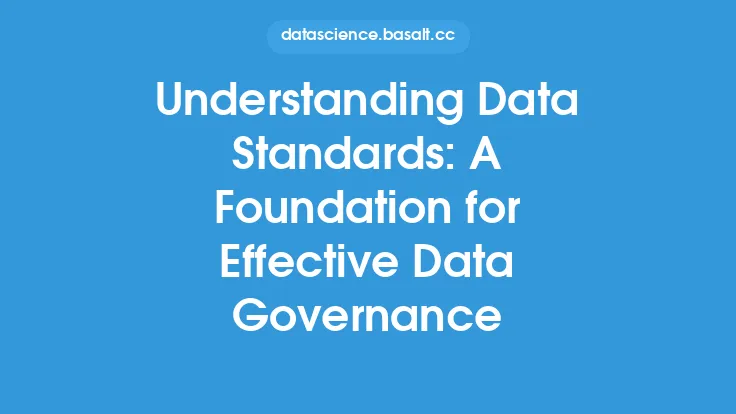In today's digital age, the collection, storage, and use of personal data have become increasingly prevalent. As a result, data privacy has emerged as a critical concern for individuals, organizations, and governments alike. Data privacy refers to the practices and procedures put in place to protect personal information from unauthorized access, use, or disclosure. It is a key component of responsible data governance, which encompasses the overall management of data within an organization. Effective data governance ensures that data is handled in a way that is secure, compliant with regulations, and respectful of individuals' rights.
Introduction to Data Privacy Principles
Data privacy principles provide a framework for organizations to follow when handling personal data. These principles are designed to ensure that data is collected, stored, and used in a way that is fair, transparent, and respectful of individuals' rights. Some of the key data privacy principles include data minimization, purpose limitation, accuracy, storage limitation, integrity, and confidentiality. Data minimization, for example, requires that organizations only collect and process the minimum amount of personal data necessary to achieve their intended purpose. Purpose limitation, on the other hand, dictates that personal data should only be used for the specific purpose for which it was collected. By adhering to these principles, organizations can demonstrate their commitment to protecting personal data and upholding individuals' rights.
The Role of Data Protection Laws and Regulations
Data protection laws and regulations play a crucial role in ensuring that organizations handle personal data in a responsible and secure manner. These laws and regulations provide a framework for data privacy and set out the rights and obligations of both individuals and organizations. Some notable examples of data protection laws and regulations include the General Data Protection Regulation (GDPR) in the European Union, the California Consumer Privacy Act (CCPA) in the United States, and the Personal Information Protection and Electronic Documents Act (PIPEDA) in Canada. These laws and regulations typically require organizations to implement robust data protection measures, such as data encryption, access controls, and incident response plans. They also provide individuals with certain rights, such as the right to access their personal data, the right to rectify inaccuracies, and the right to erasure.
Data Privacy and Security Measures
Implementing robust data privacy and security measures is essential for protecting personal data from unauthorized access, use, or disclosure. Some common data privacy and security measures include data encryption, firewalls, access controls, and intrusion detection systems. Data encryption, for example, involves converting personal data into a code that can only be deciphered with a decryption key. This makes it difficult for unauthorized individuals to access or use the data, even if they manage to intercept it. Access controls, on the other hand, involve implementing measures to restrict access to personal data to only those individuals who need it to perform their job functions. This can include measures such as password protection, multi-factor authentication, and role-based access control.
Data Breach Response and Incident Management
Despite the best efforts of organizations to protect personal data, data breaches can and do still occur. A data breach response and incident management plan is essential for responding quickly and effectively to a data breach. This plan should include procedures for containing the breach, assessing the damage, notifying affected individuals, and implementing measures to prevent similar breaches from occurring in the future. It is also important for organizations to have a clear understanding of their obligations under relevant data protection laws and regulations, such as the requirement to notify regulatory authorities and affected individuals within a certain timeframe.
The Importance of Data Privacy Awareness and Training
Data privacy awareness and training are essential for ensuring that employees understand the importance of protecting personal data and their role in upholding data privacy principles. This can include training on data protection laws and regulations, data privacy principles, and data security measures. It is also important for organizations to promote a culture of data privacy awareness, where employees feel empowered to speak up if they have concerns about data privacy or security. By providing regular training and awareness programs, organizations can help to prevent data breaches and ensure that personal data is handled in a responsible and secure manner.
Data Privacy and Third-Party Vendors
Many organizations rely on third-party vendors to provide services such as data storage, processing, and analysis. However, this can create data privacy risks if the vendor does not have adequate data protection measures in place. It is essential for organizations to carefully vet their third-party vendors and ensure that they have robust data protection measures in place. This can include conducting due diligence on the vendor's data protection practices, reviewing contracts and agreements, and monitoring the vendor's compliance with data protection laws and regulations. By taking these steps, organizations can help to mitigate the risks associated with using third-party vendors and ensure that personal data is protected.
Conclusion
In conclusion, data privacy is a critical component of responsible data governance. By understanding data privacy principles, implementing robust data protection measures, and promoting a culture of data privacy awareness, organizations can help to protect personal data and uphold individuals' rights. It is also essential for organizations to stay up-to-date with relevant data protection laws and regulations, respond quickly and effectively to data breaches, and carefully vet their third-party vendors. By taking these steps, organizations can demonstrate their commitment to data privacy and build trust with their customers, employees, and stakeholders.





